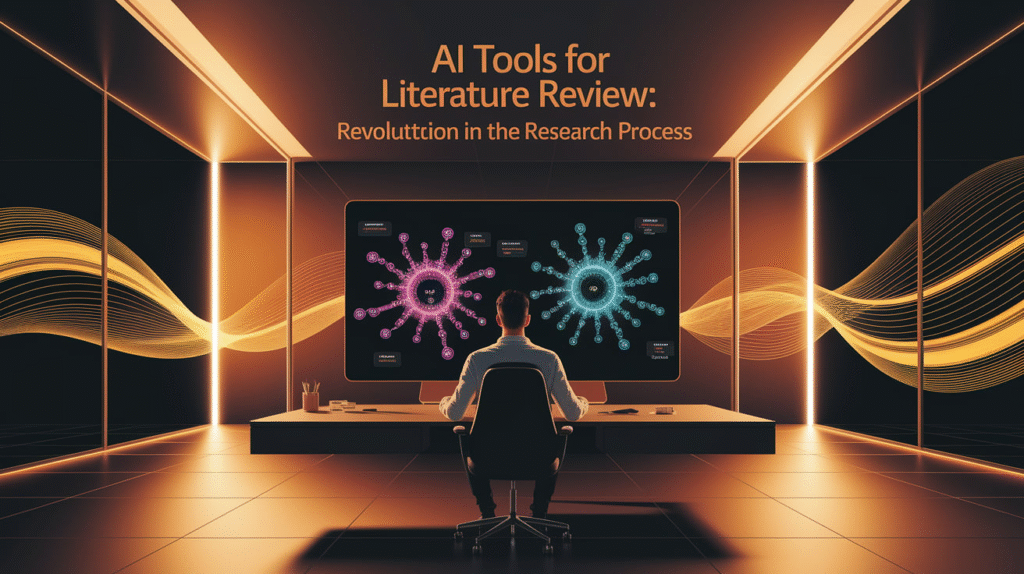AI Tools for Literature Review: Revolutionizing the Research Process

AI tools for literature review are transforming the way researchers approach their work. With advancements in technology, these tools help save time, increase accuracy, and streamline the process of finding relevant research. Instead of spending hours sifting through numerous papers, AI can assist in identifying key sources, summarizing them, and even analyzing patterns across large volumes of data. This is especially helpful for students and professionals who need to complete thorough literature reviews efficiently.
Using AI tools for literature review can improve the overall quality of research. These tools can generate insights that might be overlooked by manual searches, ensuring that the most relevant articles and studies are included. Furthermore, AI can help in organizing and categorizing the research, making it easier to create a well-structured review. As AI continues to evolve, it’s expected to become an even more integral part of academic work, not just in literature reviews, but across various research methodologies. The future of literature reviews is bright, thanks to these powerful tools.
Why AI Tools for Literature Review Are Essential for Modern Research
AI tools for literature review are essential in modern research because they help researchers manage vast amounts of academic content. These tools automate repetitive tasks such as identifying relevant articles, summarizing key points, and organizing information. Traditional methods of conducting literature reviews are time-consuming, but AI can process hundreds of papers in a fraction of the time, making the research process faster and more efficient. Additionally, AI tools can uncover valuable insights by analyzing trends and relationships within studies that researchers might otherwise overlook. As research grows in complexity and scope, the use of AI tools for literature review ensures researchers stay on top of the latest findings while also improving the quality and depth of their work.
How AI Tools for Literature Review Can Save You Time and Effort

AI tools for literature review can significantly save time and effort by automating many of the manual tasks involved in reviewing literature. Instead of spending hours searching for papers, reading through them, and organizing the information, AI can quickly scan thousands of academic articles and identify the most relevant ones for your research. These tools can also summarize articles, highlight key findings, and even help categorize sources by theme or topic. By cutting down on these time-consuming tasks, researchers can focus on the most important aspects of their work, such as analysis and writing. Overall, AI tools streamline the entire process, allowing researchers to complete literature reviews more efficiently, with greater accuracy and less manual labor.
Top AI Tools for Literature Review You Should Know About
Several AI tools for literature review are available today, each offering unique features to help researchers streamline their work. Popular tools include Zotero, EndNote, and Mendeley, which help manage and organize citations. For more advanced AI-driven solutions, tools like Iris.ai and ResearchRabbit use machine learning to suggest relevant articles, summarize research findings, and even find connections between studies. These AI tools can significantly improve the accuracy and relevance of literature reviews by automating the search and review process. Whether you’re working on a thesis, dissertation, or research paper, these AI tools can enhance your research capabilities and save you hours of manual effort.
How AI Tools for Literature Review Help You Find Relevant Studies Faster
AI tools for literature review can help researchers find relevant studies faster by utilizing machine learning algorithms that scan large volumes of academic content. These tools analyze a researcher’s keywords, research questions, and specific criteria to recommend the most relevant papers. Unlike manual searches, AI tools can process hundreds of articles in a short time, quickly filtering out irrelevant content. AI also improves accuracy by suggesting studies that might have been overlooked in traditional searches. The ability to quickly find pertinent research papers allows researchers to build their literature reviews more efficiently, ensuring they don’t miss out on valuable studies that could strengthen their work.
Improving Your Literature Review with AI Tools: A Step-by-Step Guide
Improving your literature review with AI tools is easy and efficient with the right approach. First, you need to identify the research questions and key topics that will guide your search. Then, you can use AI tools to conduct a comprehensive search of academic papers, filtering results by relevance, quality, and date of publication. Once you’ve gathered the most relevant studies, AI can assist in summarizing their key points, making it easier to synthesize information. Finally, AI tools can help organize your sources by category, ensuring that your literature review is well-structured and logical. By following these steps and using AI tools throughout the process, your literature review will be more thorough, relevant, and less time-consuming.
The Role of AI Tools for Literature Review in Academic Writing

AI tools for literature review play a significant role in academic writing by providing researchers with a quick and accurate way to gather relevant information. These tools help writers stay current with the latest research in their field, ensuring that their work is based on the most recent studies. AI-driven tools not only find articles but also analyze their content, identify trends, and suggest connections between different studies. This functionality makes literature reviews more comprehensive, which is essential in academic writing where thorough research is required. By saving time on searching and organizing sources, AI tools allow researchers to focus on the critical analysis and writing process, ultimately improving the quality of academic papers.
AI Tools for Literature Review: Reducing Bias and Improving Objectivity
AI tools for literature review help reduce bias and improve objectivity by relying on algorithms rather than personal judgment. Traditional literature reviews can be influenced by the researcher’s preconceptions or limited access to resources, but AI-driven tools provide an impartial and data-driven approach. These tools evaluate studies based on objective criteria, ensuring that the most relevant and high-quality research is included in the review. Additionally, AI can suggest papers that researchers may not have considered, helping to expand the scope of the literature review and avoid selection bias. By using AI tools, researchers can create more balanced, objective, and comprehensive literature reviews.
How AI Tools for Literature Review Assist in Identifying Research Gaps
AI tools for literature review are excellent at identifying research gaps, which are areas in a field that have not been explored or need further investigation. By analyzing a large volume of existing research, AI can pinpoint areas that lack sufficient studies or where findings are inconclusive. These tools can also highlight conflicting results between studies, revealing potential avenues for further research. This ability to detect gaps is invaluable for researchers looking to contribute new insights to their field. By using AI to identify areas that need more attention, researchers can focus on producing original work that addresses these gaps, making their literature reviews more impactful.
The Future of Literature Reviews: AI Tools Leading the Way
The future of literature reviews is likely to be heavily influenced by AI tools, which are rapidly evolving to provide even more advanced features. AI-powered tools are expected to become increasingly accurate in identifying relevant studies, summarizing findings, and analyzing trends across vast bodies of research. As AI continues to learn and improve, it may even be able to provide deeper insights, such as detecting subtle patterns or relationships between research that might not be immediately obvious. These advancements will not only make literature reviews faster and more efficient but also more comprehensive and insightful. The integration of AI tools will ultimately shape the future of academic research, offering researchers powerful tools to enhance their work.
Common Mistakes to Avoid When Using AI Tools for Literature Review

While AI tools for literature review are incredibly helpful, there are some common mistakes that researchers should avoid. One mistake is relying solely on AI recommendations without critically evaluating the sources. AI tools may suggest relevant papers, but it’s important to ensure that the sources are credible and truly applicable to your research. Another mistake is over-relying on AI for summarizing research; while these tools are efficient, they may miss nuances or key points in studies. Lastly, researchers should avoid using AI tools without fully understanding their functionality and limitations. To make the most out of these tools, it’s essential to combine AI assistance with personal expertise and critical thinking.
Conclusion
AI tools for literature review are a game-changer for researchers. They save a lot of time and help you find important studies faster. These tools make it easier to organize and summarize information, so you don’t have to spend hours looking through papers. As AI gets better, it will keep making research work easier and more efficient. It helps researchers focus on what really matters – analyzing and writing!
In the future, AI tools will only get smarter, making them even more helpful in doing a literature review. They can spot research gaps and suggest studies that researchers might miss. If you use AI tools properly, your literature review will be more thorough and organized. This means you can spend more time focusing on your own research instead of just looking for articles.
FAQs
Q: What are AI tools for literature review?
A: AI tools for literature review are software programs that help researchers find, summarize, and organize academic studies quickly and efficiently.
Q: How do AI tools save time in literature reviews?
A: AI tools scan large amounts of research articles in a short time, finding the most relevant ones so you don’t have to search manually.
Q: Can AI tools help find research gaps?
A: Yes, AI tools can analyze existing studies and identify areas that need more research or where findings are unclear.
Q: Are AI tools completely accurate in literature reviews?
A: AI tools are very helpful, but it’s important to double-check the results to make sure the research is reliable and fits your needs.
Q: Which AI tools are best for literature reviews?
A: Some popular AI tools for literature reviews are Zotero, Mendeley, Iris.ai, and ResearchRabbit. These tools help organize and suggest relevant papers.





